The South Africa AIDS Controversy
VerifiedAdded on 2023/04/21
|5
|1884
|77
AI Summary
This case study explores the South Africa AIDS controversy and the ethical/legal issues surrounding it. It discusses the options available to pharmaceutical companies and the expectations of stakeholders. The study also analyzes the potential consequences of different decisions and proposes a balanced approach.
Contribute Materials
Your contribution can guide someone’s learning journey. Share your
documents today.
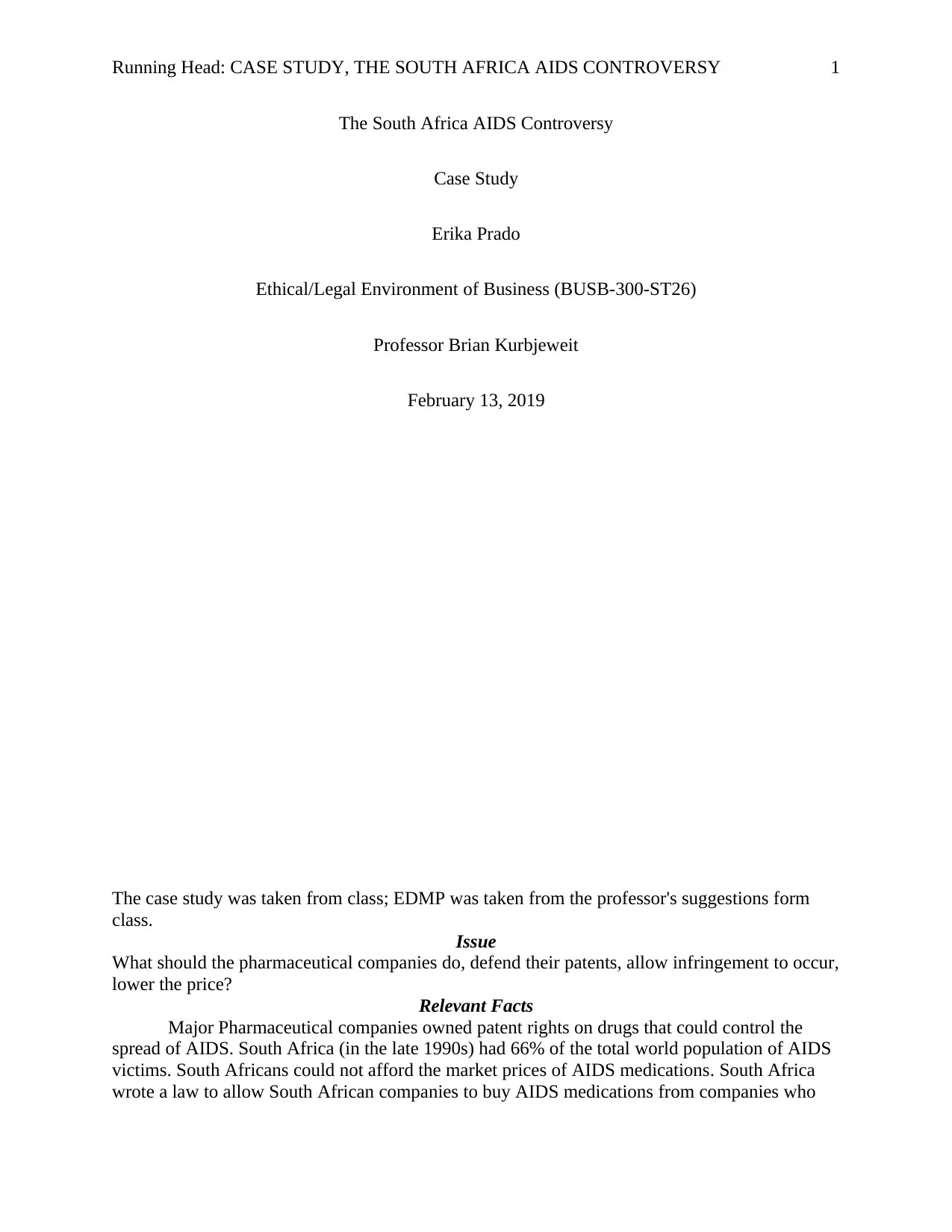
Running Head: CASE STUDY, THE SOUTH AFRICA AIDS CONTROVERSY 1
The South Africa AIDS Controversy
Case Study
Erika Prado
Ethical/Legal Environment of Business (BUSB-300-ST26)
Professor Brian Kurbjeweit
February 13, 2019
The case study was taken from class; EDMP was taken from the professor's suggestions form
class.
Issue
What should the pharmaceutical companies do, defend their patents, allow infringement to occur,
lower the price?
Relevant Facts
Major Pharmaceutical companies owned patent rights on drugs that could control the
spread of AIDS. South Africa (in the late 1990s) had 66% of the total world population of AIDS
victims. South Africans could not afford the market prices of AIDS medications. South Africa
wrote a law to allow South African companies to buy AIDS medications from companies who
The South Africa AIDS Controversy
Case Study
Erika Prado
Ethical/Legal Environment of Business (BUSB-300-ST26)
Professor Brian Kurbjeweit
February 13, 2019
The case study was taken from class; EDMP was taken from the professor's suggestions form
class.
Issue
What should the pharmaceutical companies do, defend their patents, allow infringement to occur,
lower the price?
Relevant Facts
Major Pharmaceutical companies owned patent rights on drugs that could control the
spread of AIDS. South Africa (in the late 1990s) had 66% of the total world population of AIDS
victims. South Africans could not afford the market prices of AIDS medications. South Africa
wrote a law to allow South African companies to buy AIDS medications from companies who
Secure Best Marks with AI Grader
Need help grading? Try our AI Grader for instant feedback on your assignments.
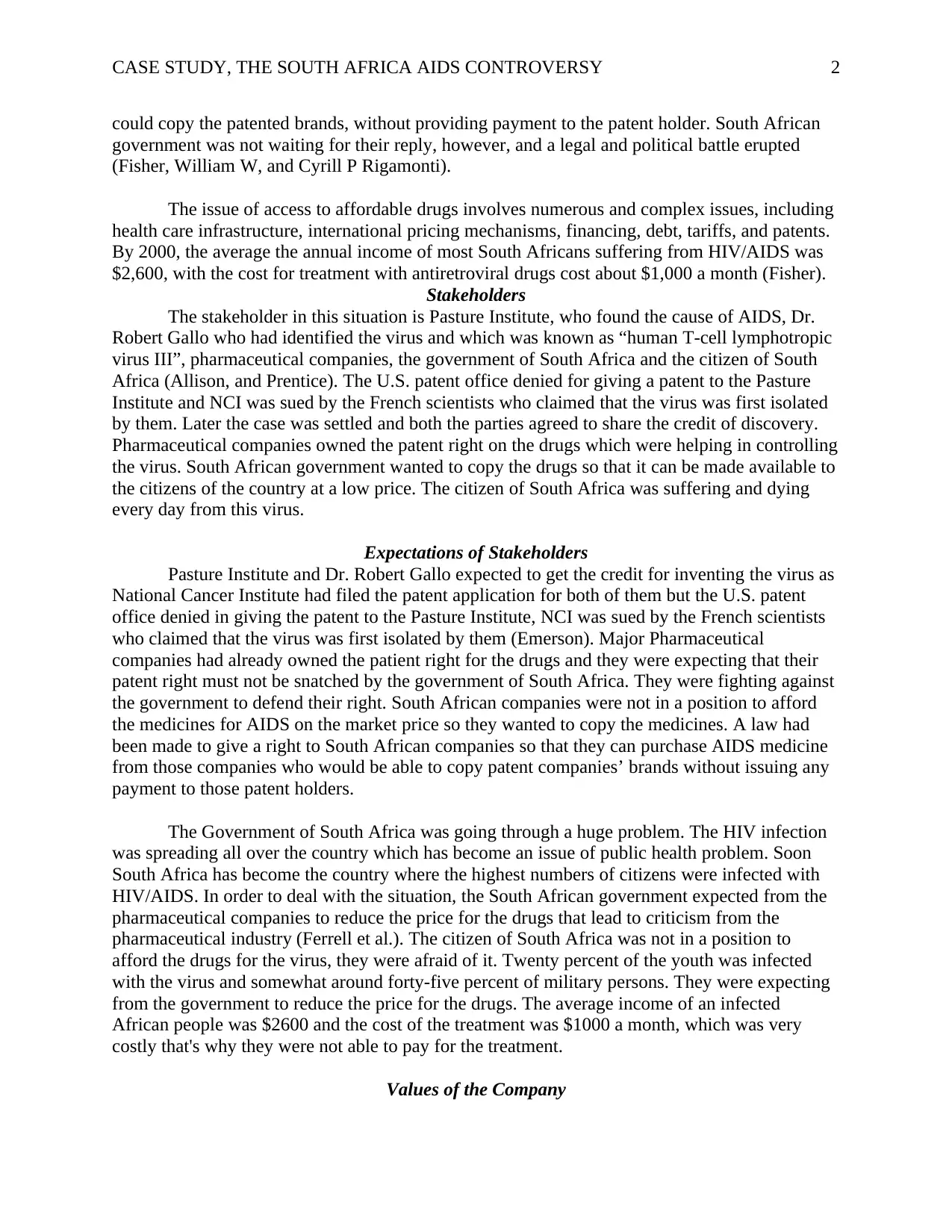
CASE STUDY, THE SOUTH AFRICA AIDS CONTROVERSY 2
could copy the patented brands, without providing payment to the patent holder. South African
government was not waiting for their reply, however, and a legal and political battle erupted
(Fisher, William W, and Cyrill P Rigamonti).
The issue of access to affordable drugs involves numerous and complex issues, including
health care infrastructure, international pricing mechanisms, financing, debt, tariffs, and patents.
By 2000, the average the annual income of most South Africans suffering from HIV/AIDS was
$2,600, with the cost for treatment with antiretroviral drugs cost about $1,000 a month (Fisher).
Stakeholders
The stakeholder in this situation is Pasture Institute, who found the cause of AIDS, Dr.
Robert Gallo who had identified the virus and which was known as “human T-cell lymphotropic
virus III”, pharmaceutical companies, the government of South Africa and the citizen of South
Africa (Allison, and Prentice). The U.S. patent office denied for giving a patent to the Pasture
Institute and NCI was sued by the French scientists who claimed that the virus was first isolated
by them. Later the case was settled and both the parties agreed to share the credit of discovery.
Pharmaceutical companies owned the patent right on the drugs which were helping in controlling
the virus. South African government wanted to copy the drugs so that it can be made available to
the citizens of the country at a low price. The citizen of South Africa was suffering and dying
every day from this virus.
Expectations of Stakeholders
Pasture Institute and Dr. Robert Gallo expected to get the credit for inventing the virus as
National Cancer Institute had filed the patent application for both of them but the U.S. patent
office denied in giving the patent to the Pasture Institute, NCI was sued by the French scientists
who claimed that the virus was first isolated by them (Emerson). Major Pharmaceutical
companies had already owned the patient right for the drugs and they were expecting that their
patent right must not be snatched by the government of South Africa. They were fighting against
the government to defend their right. South African companies were not in a position to afford
the medicines for AIDS on the market price so they wanted to copy the medicines. A law had
been made to give a right to South African companies so that they can purchase AIDS medicine
from those companies who would be able to copy patent companies’ brands without issuing any
payment to those patent holders.
The Government of South Africa was going through a huge problem. The HIV infection
was spreading all over the country which has become an issue of public health problem. Soon
South Africa has become the country where the highest numbers of citizens were infected with
HIV/AIDS. In order to deal with the situation, the South African government expected from the
pharmaceutical companies to reduce the price for the drugs that lead to criticism from the
pharmaceutical industry (Ferrell et al.). The citizen of South Africa was not in a position to
afford the drugs for the virus, they were afraid of it. Twenty percent of the youth was infected
with the virus and somewhat around forty-five percent of military persons. They were expecting
from the government to reduce the price for the drugs. The average income of an infected
African people was $2600 and the cost of the treatment was $1000 a month, which was very
costly that's why they were not able to pay for the treatment.
Values of the Company
could copy the patented brands, without providing payment to the patent holder. South African
government was not waiting for their reply, however, and a legal and political battle erupted
(Fisher, William W, and Cyrill P Rigamonti).
The issue of access to affordable drugs involves numerous and complex issues, including
health care infrastructure, international pricing mechanisms, financing, debt, tariffs, and patents.
By 2000, the average the annual income of most South Africans suffering from HIV/AIDS was
$2,600, with the cost for treatment with antiretroviral drugs cost about $1,000 a month (Fisher).
Stakeholders
The stakeholder in this situation is Pasture Institute, who found the cause of AIDS, Dr.
Robert Gallo who had identified the virus and which was known as “human T-cell lymphotropic
virus III”, pharmaceutical companies, the government of South Africa and the citizen of South
Africa (Allison, and Prentice). The U.S. patent office denied for giving a patent to the Pasture
Institute and NCI was sued by the French scientists who claimed that the virus was first isolated
by them. Later the case was settled and both the parties agreed to share the credit of discovery.
Pharmaceutical companies owned the patent right on the drugs which were helping in controlling
the virus. South African government wanted to copy the drugs so that it can be made available to
the citizens of the country at a low price. The citizen of South Africa was suffering and dying
every day from this virus.
Expectations of Stakeholders
Pasture Institute and Dr. Robert Gallo expected to get the credit for inventing the virus as
National Cancer Institute had filed the patent application for both of them but the U.S. patent
office denied in giving the patent to the Pasture Institute, NCI was sued by the French scientists
who claimed that the virus was first isolated by them (Emerson). Major Pharmaceutical
companies had already owned the patient right for the drugs and they were expecting that their
patent right must not be snatched by the government of South Africa. They were fighting against
the government to defend their right. South African companies were not in a position to afford
the medicines for AIDS on the market price so they wanted to copy the medicines. A law had
been made to give a right to South African companies so that they can purchase AIDS medicine
from those companies who would be able to copy patent companies’ brands without issuing any
payment to those patent holders.
The Government of South Africa was going through a huge problem. The HIV infection
was spreading all over the country which has become an issue of public health problem. Soon
South Africa has become the country where the highest numbers of citizens were infected with
HIV/AIDS. In order to deal with the situation, the South African government expected from the
pharmaceutical companies to reduce the price for the drugs that lead to criticism from the
pharmaceutical industry (Ferrell et al.). The citizen of South Africa was not in a position to
afford the drugs for the virus, they were afraid of it. Twenty percent of the youth was infected
with the virus and somewhat around forty-five percent of military persons. They were expecting
from the government to reduce the price for the drugs. The average income of an infected
African people was $2600 and the cost of the treatment was $1000 a month, which was very
costly that's why they were not able to pay for the treatment.
Values of the Company
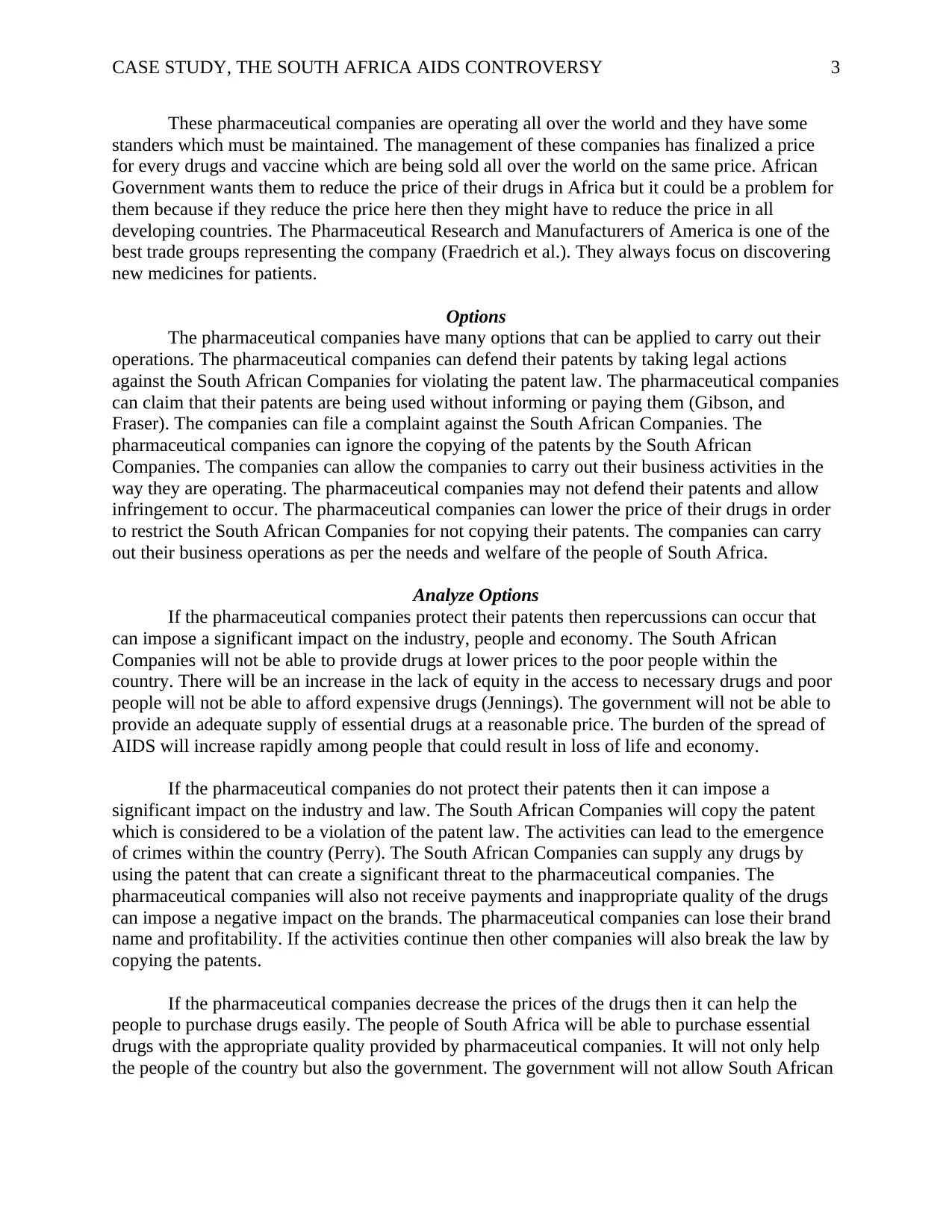
CASE STUDY, THE SOUTH AFRICA AIDS CONTROVERSY 3
These pharmaceutical companies are operating all over the world and they have some
standers which must be maintained. The management of these companies has finalized a price
for every drugs and vaccine which are being sold all over the world on the same price. African
Government wants them to reduce the price of their drugs in Africa but it could be a problem for
them because if they reduce the price here then they might have to reduce the price in all
developing countries. The Pharmaceutical Research and Manufacturers of America is one of the
best trade groups representing the company (Fraedrich et al.). They always focus on discovering
new medicines for patients.
Options
The pharmaceutical companies have many options that can be applied to carry out their
operations. The pharmaceutical companies can defend their patents by taking legal actions
against the South African Companies for violating the patent law. The pharmaceutical companies
can claim that their patents are being used without informing or paying them (Gibson, and
Fraser). The companies can file a complaint against the South African Companies. The
pharmaceutical companies can ignore the copying of the patents by the South African
Companies. The companies can allow the companies to carry out their business activities in the
way they are operating. The pharmaceutical companies may not defend their patents and allow
infringement to occur. The pharmaceutical companies can lower the price of their drugs in order
to restrict the South African Companies for not copying their patents. The companies can carry
out their business operations as per the needs and welfare of the people of South Africa.
Analyze Options
If the pharmaceutical companies protect their patents then repercussions can occur that
can impose a significant impact on the industry, people and economy. The South African
Companies will not be able to provide drugs at lower prices to the poor people within the
country. There will be an increase in the lack of equity in the access to necessary drugs and poor
people will not be able to afford expensive drugs (Jennings). The government will not be able to
provide an adequate supply of essential drugs at a reasonable price. The burden of the spread of
AIDS will increase rapidly among people that could result in loss of life and economy.
If the pharmaceutical companies do not protect their patents then it can impose a
significant impact on the industry and law. The South African Companies will copy the patent
which is considered to be a violation of the patent law. The activities can lead to the emergence
of crimes within the country (Perry). The South African Companies can supply any drugs by
using the patent that can create a significant threat to the pharmaceutical companies. The
pharmaceutical companies will also not receive payments and inappropriate quality of the drugs
can impose a negative impact on the brands. The pharmaceutical companies can lose their brand
name and profitability. If the activities continue then other companies will also break the law by
copying the patents.
If the pharmaceutical companies decrease the prices of the drugs then it can help the
people to purchase drugs easily. The people of South Africa will be able to purchase essential
drugs with the appropriate quality provided by pharmaceutical companies. It will not only help
the people of the country but also the government. The government will not allow South African
These pharmaceutical companies are operating all over the world and they have some
standers which must be maintained. The management of these companies has finalized a price
for every drugs and vaccine which are being sold all over the world on the same price. African
Government wants them to reduce the price of their drugs in Africa but it could be a problem for
them because if they reduce the price here then they might have to reduce the price in all
developing countries. The Pharmaceutical Research and Manufacturers of America is one of the
best trade groups representing the company (Fraedrich et al.). They always focus on discovering
new medicines for patients.
Options
The pharmaceutical companies have many options that can be applied to carry out their
operations. The pharmaceutical companies can defend their patents by taking legal actions
against the South African Companies for violating the patent law. The pharmaceutical companies
can claim that their patents are being used without informing or paying them (Gibson, and
Fraser). The companies can file a complaint against the South African Companies. The
pharmaceutical companies can ignore the copying of the patents by the South African
Companies. The companies can allow the companies to carry out their business activities in the
way they are operating. The pharmaceutical companies may not defend their patents and allow
infringement to occur. The pharmaceutical companies can lower the price of their drugs in order
to restrict the South African Companies for not copying their patents. The companies can carry
out their business operations as per the needs and welfare of the people of South Africa.
Analyze Options
If the pharmaceutical companies protect their patents then repercussions can occur that
can impose a significant impact on the industry, people and economy. The South African
Companies will not be able to provide drugs at lower prices to the poor people within the
country. There will be an increase in the lack of equity in the access to necessary drugs and poor
people will not be able to afford expensive drugs (Jennings). The government will not be able to
provide an adequate supply of essential drugs at a reasonable price. The burden of the spread of
AIDS will increase rapidly among people that could result in loss of life and economy.
If the pharmaceutical companies do not protect their patents then it can impose a
significant impact on the industry and law. The South African Companies will copy the patent
which is considered to be a violation of the patent law. The activities can lead to the emergence
of crimes within the country (Perry). The South African Companies can supply any drugs by
using the patent that can create a significant threat to the pharmaceutical companies. The
pharmaceutical companies will also not receive payments and inappropriate quality of the drugs
can impose a negative impact on the brands. The pharmaceutical companies can lose their brand
name and profitability. If the activities continue then other companies will also break the law by
copying the patents.
If the pharmaceutical companies decrease the prices of the drugs then it can help the
people to purchase drugs easily. The people of South Africa will be able to purchase essential
drugs with the appropriate quality provided by pharmaceutical companies. It will not only help
the people of the country but also the government. The government will not allow South African
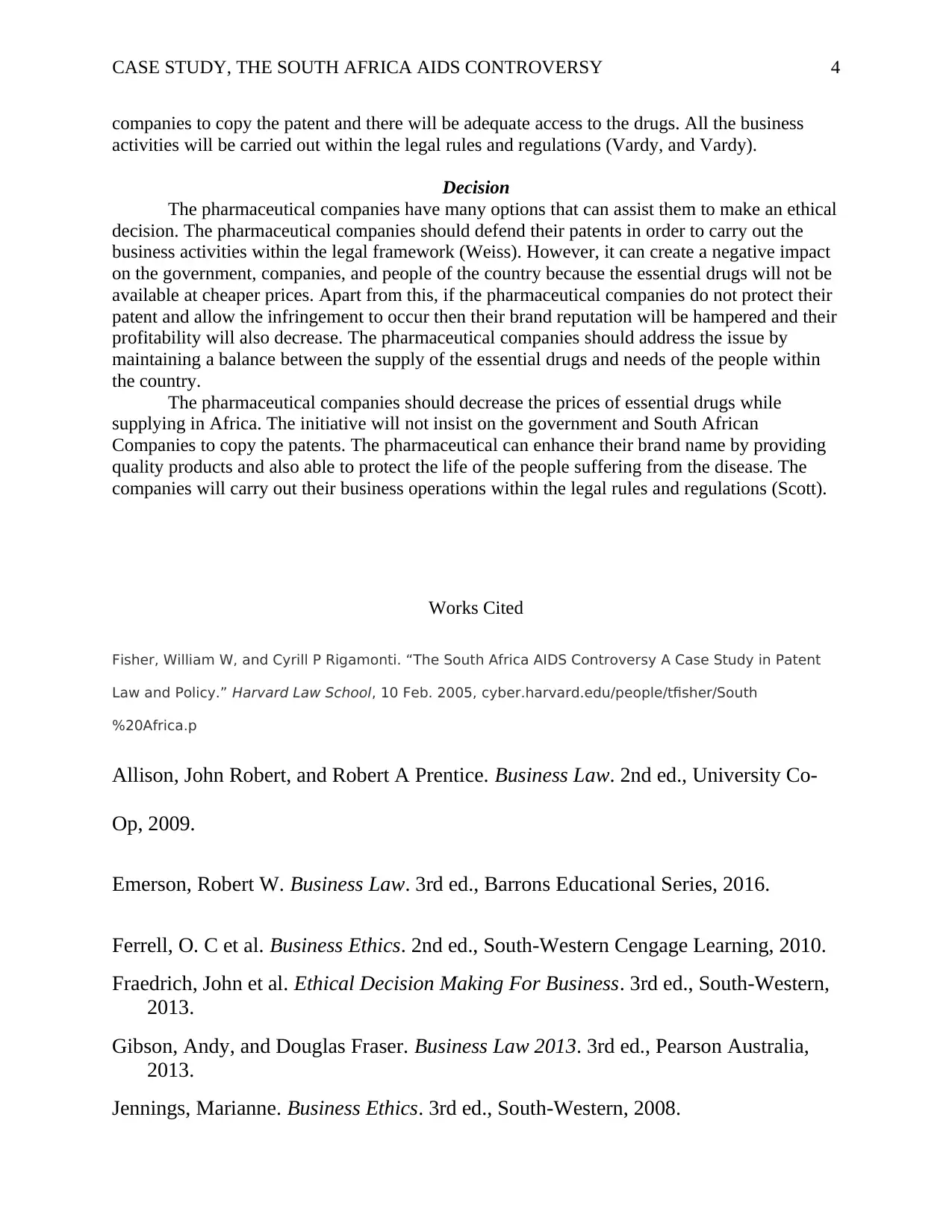
CASE STUDY, THE SOUTH AFRICA AIDS CONTROVERSY 4
companies to copy the patent and there will be adequate access to the drugs. All the business
activities will be carried out within the legal rules and regulations (Vardy, and Vardy).
Decision
The pharmaceutical companies have many options that can assist them to make an ethical
decision. The pharmaceutical companies should defend their patents in order to carry out the
business activities within the legal framework (Weiss). However, it can create a negative impact
on the government, companies, and people of the country because the essential drugs will not be
available at cheaper prices. Apart from this, if the pharmaceutical companies do not protect their
patent and allow the infringement to occur then their brand reputation will be hampered and their
profitability will also decrease. The pharmaceutical companies should address the issue by
maintaining a balance between the supply of the essential drugs and needs of the people within
the country.
The pharmaceutical companies should decrease the prices of essential drugs while
supplying in Africa. The initiative will not insist on the government and South African
Companies to copy the patents. The pharmaceutical can enhance their brand name by providing
quality products and also able to protect the life of the people suffering from the disease. The
companies will carry out their business operations within the legal rules and regulations (Scott).
Works Cited
Fisher, William W, and Cyrill P Rigamonti. “The South Africa AIDS Controversy A Case Study in Patent
Law and Policy.” Harvard Law School, 10 Feb. 2005, cyber.harvard.edu/people/tfisher/South
%20Africa.p
Allison, John Robert, and Robert A Prentice. Business Law. 2nd ed., University Co-
Op, 2009.
Emerson, Robert W. Business Law. 3rd ed., Barrons Educational Series, 2016.
Ferrell, O. C et al. Business Ethics. 2nd ed., South-Western Cengage Learning, 2010.
Fraedrich, John et al. Ethical Decision Making For Business. 3rd ed., South-Western,
2013.
Gibson, Andy, and Douglas Fraser. Business Law 2013. 3rd ed., Pearson Australia,
2013.
Jennings, Marianne. Business Ethics. 3rd ed., South-Western, 2008.
companies to copy the patent and there will be adequate access to the drugs. All the business
activities will be carried out within the legal rules and regulations (Vardy, and Vardy).
Decision
The pharmaceutical companies have many options that can assist them to make an ethical
decision. The pharmaceutical companies should defend their patents in order to carry out the
business activities within the legal framework (Weiss). However, it can create a negative impact
on the government, companies, and people of the country because the essential drugs will not be
available at cheaper prices. Apart from this, if the pharmaceutical companies do not protect their
patent and allow the infringement to occur then their brand reputation will be hampered and their
profitability will also decrease. The pharmaceutical companies should address the issue by
maintaining a balance between the supply of the essential drugs and needs of the people within
the country.
The pharmaceutical companies should decrease the prices of essential drugs while
supplying in Africa. The initiative will not insist on the government and South African
Companies to copy the patents. The pharmaceutical can enhance their brand name by providing
quality products and also able to protect the life of the people suffering from the disease. The
companies will carry out their business operations within the legal rules and regulations (Scott).
Works Cited
Fisher, William W, and Cyrill P Rigamonti. “The South Africa AIDS Controversy A Case Study in Patent
Law and Policy.” Harvard Law School, 10 Feb. 2005, cyber.harvard.edu/people/tfisher/South
%20Africa.p
Allison, John Robert, and Robert A Prentice. Business Law. 2nd ed., University Co-
Op, 2009.
Emerson, Robert W. Business Law. 3rd ed., Barrons Educational Series, 2016.
Ferrell, O. C et al. Business Ethics. 2nd ed., South-Western Cengage Learning, 2010.
Fraedrich, John et al. Ethical Decision Making For Business. 3rd ed., South-Western,
2013.
Gibson, Andy, and Douglas Fraser. Business Law 2013. 3rd ed., Pearson Australia,
2013.
Jennings, Marianne. Business Ethics. 3rd ed., South-Western, 2008.
Secure Best Marks with AI Grader
Need help grading? Try our AI Grader for instant feedback on your assignments.
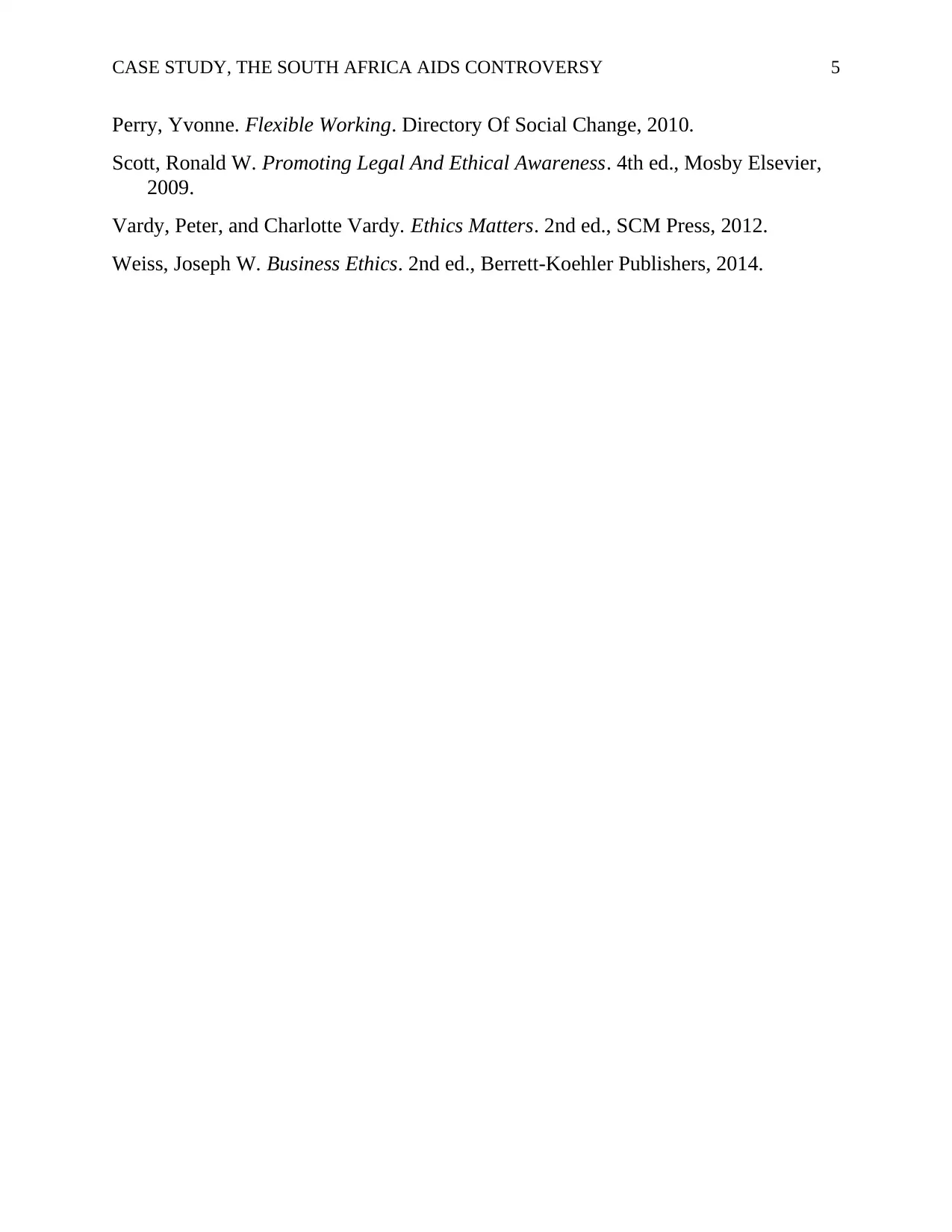
CASE STUDY, THE SOUTH AFRICA AIDS CONTROVERSY 5
Perry, Yvonne. Flexible Working. Directory Of Social Change, 2010.
Scott, Ronald W. Promoting Legal And Ethical Awareness. 4th ed., Mosby Elsevier,
2009.
Vardy, Peter, and Charlotte Vardy. Ethics Matters. 2nd ed., SCM Press, 2012.
Weiss, Joseph W. Business Ethics. 2nd ed., Berrett-Koehler Publishers, 2014.
Perry, Yvonne. Flexible Working. Directory Of Social Change, 2010.
Scott, Ronald W. Promoting Legal And Ethical Awareness. 4th ed., Mosby Elsevier,
2009.
Vardy, Peter, and Charlotte Vardy. Ethics Matters. 2nd ed., SCM Press, 2012.
Weiss, Joseph W. Business Ethics. 2nd ed., Berrett-Koehler Publishers, 2014.
1 out of 5
Your All-in-One AI-Powered Toolkit for Academic Success.
+13062052269
info@desklib.com
Available 24*7 on WhatsApp / Email
![[object Object]](/_next/static/media/star-bottom.7253800d.svg)
Unlock your academic potential
© 2024 | Zucol Services PVT LTD | All rights reserved.